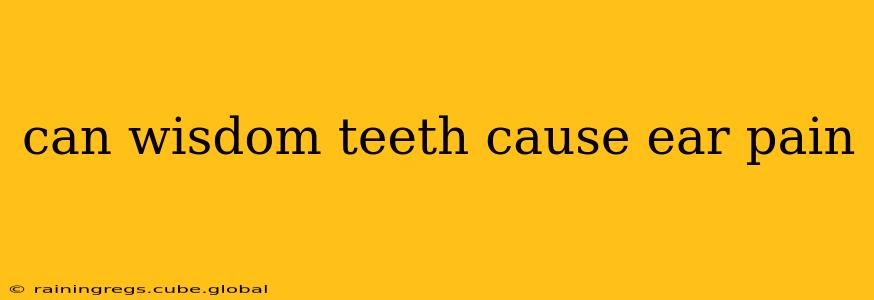The nagging ache in your ear. The throbbing discomfort that seems to radiate from deep within. Could it be your wisdom teeth? The answer, surprisingly, is often yes. While ear pain isn't the first symptom most associate with impacted wisdom teeth, it's a surprisingly common occurrence. This comprehensive guide will explore the connection between wisdom teeth and ear pain, examining the underlying causes and explaining what you should do if you're experiencing this distressing combination of symptoms.
What is the Connection Between Wisdom Teeth and Ear Pain?
The close proximity of your wisdom teeth to your ears plays a crucial role. The nerves and blood vessels in this region are intricately interwoven. Inflammation or infection around the wisdom teeth can easily irritate these nerves, causing referred pain in the ear. This isn't a direct connection – the pain isn't originating in the ear – but rather radiating from the impacted tooth to the ear via shared neural pathways.
Think of it like this: a problem in one area might manifest as pain in another, somewhat distant location. This is a common phenomenon in the body, known as referred pain.
Why Do Impacted Wisdom Teeth Cause Ear Pain?
Several factors contribute to ear pain associated with wisdom teeth:
-
Infection: An infected wisdom tooth (pericoronitis) is a significant culprit. The infection can spread, irritating the surrounding tissues and nerves leading to the ear. Symptoms might include swelling, redness, and pus around the wisdom tooth, along with the earache.
-
Inflammation: Even without infection, the inflammation caused by a partially erupted or impacted wisdom tooth can put pressure on nearby nerves, triggering ear pain. This pressure can be intense, especially if the tooth is partially impacted and causing the gum tissue to swell.
-
Referred Pain: As mentioned before, the intricate nerve network in the jaw and ear region is the primary reason for referred pain. Any irritation or pressure around the wisdom teeth can send signals along these nerves, manifesting as pain in the ear.
-
Sinus Infection (Less Common): While less directly related, a sinus infection can sometimes exacerbate pain associated with wisdom teeth, creating a more intense earache. This is because the sinuses are close to both the upper molars and the ear.
Can Wisdom Teeth Cause Ear Pain Without Other Symptoms?
While ear pain is often accompanied by other symptoms like jaw pain, swelling, or difficulty opening your mouth, it's possible to experience ear pain as the primary symptom. This can make it difficult to diagnose the cause, leading you to focus on the ear issue rather than the underlying problem with your wisdom teeth.
How Long Does Ear Pain from Wisdom Teeth Last?
The duration of ear pain from wisdom teeth varies. If it's due to inflammation, it might resolve once the inflammation subsides. However, if an infection is involved, the pain may persist for several days or even weeks without treatment. Seeking professional help is essential to determine the cause and receive appropriate treatment.
How to Treat Ear Pain from Wisdom Teeth?
Treating ear pain linked to wisdom teeth depends on the underlying cause. It's crucial to see a dentist or oral surgeon for a proper diagnosis and treatment plan. Options may include:
- Antibiotics: To combat infection if present.
- Pain relievers: Over-the-counter medications like ibuprofen or acetaminophen can help manage pain and inflammation.
- Surgical removal (extraction): This is often the necessary solution for impacted or chronically problematic wisdom teeth.
When to See a Dentist or Oral Surgeon?
If you experience ear pain alongside any of the following symptoms, schedule an appointment immediately:
- Swelling of the jaw or face
- Difficulty opening your mouth (trismus)
- Fever
- Pus around the wisdom teeth
- Severe or persistent pain
Remember, self-treating can be risky. Prompt professional assessment will help ensure accurate diagnosis and effective management of your condition. Ignoring the problem can lead to further complications. Your dental health is crucial; prioritize professional care to address the underlying issue and alleviate the ear pain.
